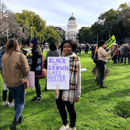Let’s face it- social media is a powerful force in today’s society. Through the use of Instagram and Twitter, to name a few platforms, you can gain exposure to information that might be hard to find elsewhere. In recent days, with protests occurring in every part of the country, social media has been an exceedingly useful tool to allow for the rapid spread of information. With social media, people have the power to uplift black voices, share links to petitions, offer resources, and spread donation links.
While social media can be used to unite people for something meaningful, such as Black Lives Matter, it’s essential to clarify the difference between showing meaningful support and posting fluff for the sake of fitting in. By signing petitions, going to protests, having tough conversations with family and friends, or donating, you can be an activist. Just because someone isn’t posting on social media doesn’t mean that they aren’t showing immense support in more private, yet still meaningful, ways. It’s not fair to “cancel” people for not advertising their donations and publishing their conversations.
With the threat of being looked down upon for not actively posting, people lean toward an easy route out: performative activism. Performative activism is used to increase one’s social capital rather than demonstrate one’s devotion to a cause. The other day, I observed hundreds of the people I follow posting black squares in support of Black Lives Matter. Hundreds of people who had not once shared their support online prior. This is the perfect example of performative activism; people clogging the crucial #blacklivesmatter tag on Instagram with millions of blacked out posts. This tag is a resource frequently used to update on situations at protests, and “Blackout Tuesday” rendered it effectively useless.

I’m not here to say that posting on social media is bad. I think it can be highly beneficial, if used in an effective manner. Personally, I feel uncomfortable advertising how much I donate and have decided to use my platform to uplift black voices, educate my white followers, and share resources such as petitions. I want to use the space I occupy on the internet in the most helpful way possible, without overstepping my boundaries as an ally.
Next time you post on social media, I encourage you to ask yourself, “Is this useful?” “Am I posting this for social approval, or do I genuinely stand behind it?” “Is this how I can best be occupying my space online?” If the answers are yes, go ahead. If not, please take the time to reevaluate your intentions and educate yourself on how to be a better ally. Performative activism isn’t good enough.




